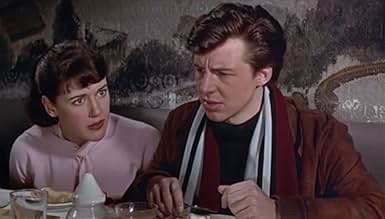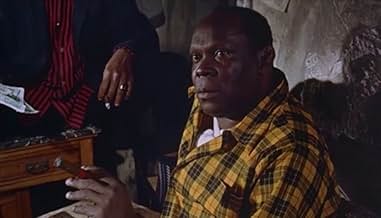IMDb-BEWERTUNG
7,2/10
2785
IHRE BEWERTUNG
Der mord an einer jungen frau in London offenbart die tiefen rassenspannungen und vorurteile in dieser gegend.Der mord an einer jungen frau in London offenbart die tiefen rassenspannungen und vorurteile in dieser gegend.Der mord an einer jungen frau in London offenbart die tiefen rassenspannungen und vorurteile in dieser gegend.
- Regie
- Drehbuch
- Hauptbesetzung
- 1 BAFTA Award gewonnen
- 3 Gewinne & 4 Nominierungen insgesamt
Thomas Baptiste
- Man on the Street
- (Nicht genannt)
Victor Brooks
- Police Sergeant
- (Nicht genannt)
Marie Burke
- Second landlady
- (Nicht genannt)
Empfohlene Bewertungen
When a young woman's body is discovered on London's Hampstead Heath, the ensuing investigation quickly focuses on racial bigotry and hatred in 1950s Britain, exposing the prejudice amongst those under investigation AND those investigating.
Like so many other films from the 1940s and 1950s, Sapphire is yet another piece of groundbreaking British cinema now long forgotten. A little clunky and overly reliant on stereotyping by today's standards, but still a fascinating exploration of the fears and struggles inherent in a newly mixed-race society. Dearden has brought together an interesting cast here, cleverly giving matinée idol Craig a fairly unsympathetic role as a racist police officer, and being superbly served by Mitchell - her final scene is at once both compelling and distressing. Too many British cinema actors of the 40's and 50's have now been forgotten, and Mitchell is a prime example of why individual and collective reappraisals and retrospectives are long overdue.
Interesting companion piece to 1961's Flame In The Streets, then, and definitely worth catching if you can.
Like so many other films from the 1940s and 1950s, Sapphire is yet another piece of groundbreaking British cinema now long forgotten. A little clunky and overly reliant on stereotyping by today's standards, but still a fascinating exploration of the fears and struggles inherent in a newly mixed-race society. Dearden has brought together an interesting cast here, cleverly giving matinée idol Craig a fairly unsympathetic role as a racist police officer, and being superbly served by Mitchell - her final scene is at once both compelling and distressing. Too many British cinema actors of the 40's and 50's have now been forgotten, and Mitchell is a prime example of why individual and collective reappraisals and retrospectives are long overdue.
Interesting companion piece to 1961's Flame In The Streets, then, and definitely worth catching if you can.
I was amazed by the shocking brutality of the racism in this film. In America, we are rarely presented with such casual racism; in films of the 50s, race is practically never dealt with in films, as Todd Haynes "remake" of Douglas Sirk's All That Heaven Allows tries to make up for. And current films about the 50s present such two dimensional characters that it is easy to tell the racist villains from the open-minded heroes. In Sapphire, filmed in Britain in the 1950s, one of the most interesting characters is Michael Craig's detective, supposedly our hero, but constantly making racist remarks. His comments are always countered by the more reasonable older inspector, but this allows his gradual transformation throughout the film. Although some of the film is a bit heavy-handed, ultimately the message is sadly still relevant. 4 out of 5.
Excellent film, directed by Basil Dearden, who directed Dead of Night and Victim, two marvelous movies.
Sapphire takes place in the '50s - the film was released in 1959 - in England. A young woman is found dead in a park. It turns out her name is Sapphire Robbins, and she was engaged to a young man, David Harris (Paul Massie). The autopsy shows that she was three months' pregnant, and David admits that he was the father.
When Sapphire's brother (Earl Cameron) shows up, the superintendent in charge of the case (Nigel Patrick) is surprised that he's black. Sapphire was passing. The detective wonders if the Harris family knew - - and when they knew it.
David had won a scholarship and was to go off to school - could he be saddled with a wife and child? His father (Bernard Miles) is very protective of him, and his sister (Yvonne Mitchell) is somewhat abrasive.
This is the story of underlying prejudice and assumptions about black people that were pervasive at the time, particularly when this film was made. Notting Hill race riots took place in 1958. These prejudices are expressed by the inspector on the case (Michael Craig), especially the myths of black sexuality.
Dearden liked to tackle these tough subjects, which he does very well, showing it as an underlying constant. Landladies have "white" houses, black friends dropped by Sapphire when she found out she could pass seem to understand her dropping them.
The scene at the Tulips Club is the best in the film, with pulsating bongos and wild dancing. The camera veers all over the room, showing twirling skirts, legs, black people dancing with women who appear to be white. There a man tells the superintendent no matter how white a woman is, you can tell she is actually black because she can't resist the sound of the bongos.
Very strong acting throughout, particularly by stage actress Yvonne Mitchell. One thing that shows that Dearden knew what he was doing -- people's reaction to death. When the woman in the park discovers the body, she doesn't scream. And when David learns of the death of Sapphire, he seems shell-shocked and numb. Sapphire's brother seems very calm, finally breaking down and asking, "How could anyone do this?" All very realistic, all not over the top.
A must see - it is available on Netflix and on Amazon instant video.
Sapphire takes place in the '50s - the film was released in 1959 - in England. A young woman is found dead in a park. It turns out her name is Sapphire Robbins, and she was engaged to a young man, David Harris (Paul Massie). The autopsy shows that she was three months' pregnant, and David admits that he was the father.
When Sapphire's brother (Earl Cameron) shows up, the superintendent in charge of the case (Nigel Patrick) is surprised that he's black. Sapphire was passing. The detective wonders if the Harris family knew - - and when they knew it.
David had won a scholarship and was to go off to school - could he be saddled with a wife and child? His father (Bernard Miles) is very protective of him, and his sister (Yvonne Mitchell) is somewhat abrasive.
This is the story of underlying prejudice and assumptions about black people that were pervasive at the time, particularly when this film was made. Notting Hill race riots took place in 1958. These prejudices are expressed by the inspector on the case (Michael Craig), especially the myths of black sexuality.
Dearden liked to tackle these tough subjects, which he does very well, showing it as an underlying constant. Landladies have "white" houses, black friends dropped by Sapphire when she found out she could pass seem to understand her dropping them.
The scene at the Tulips Club is the best in the film, with pulsating bongos and wild dancing. The camera veers all over the room, showing twirling skirts, legs, black people dancing with women who appear to be white. There a man tells the superintendent no matter how white a woman is, you can tell she is actually black because she can't resist the sound of the bongos.
Very strong acting throughout, particularly by stage actress Yvonne Mitchell. One thing that shows that Dearden knew what he was doing -- people's reaction to death. When the woman in the park discovers the body, she doesn't scream. And when David learns of the death of Sapphire, he seems shell-shocked and numb. Sapphire's brother seems very calm, finally breaking down and asking, "How could anyone do this?" All very realistic, all not over the top.
A must see - it is available on Netflix and on Amazon instant video.
10kreeper
this is one of the most underappreciated films of all times. it is a superbly acted and directed film with a very intelligent and well crafted screenplay. the "twist" is revealed just at the right moment and is not played for any exploitative reason but still resonates throughout the course of the film. i have the video of this film, which is not listed anywhere and just got the poster, that is how much i love this film. if you are looking for a stupid bang bang movie don't bother, if you're looking for a goofy feel good movie, go elsewhere, but if you appreciate well-crafted film making this is your movie.
The real problem with television broadcasting is that the better movies of the last century are held from the viewers. SAPPHIRE could be shown as a double bill with AN INSPECTOR CALLS. There are not enough movie buffs to push some of these classics so that they can be shown to today's audiences ..which would really appreciate them.
Wusstest du schon
- WissenswertesThe success of this movie, in spite of its controversial themes, encouraged Janet Green to write Teufelskreis (1961), and Basil Dearden to direct it.
- PatzerThe ripped photo used as a clue appears in two versions from the first time it's discovered. The first version shows Sapphire laughing as she dances, with her mouth open. The second shows her smiling broadly with her jaw closed.
- Zitate
[last lines]
Superintendent Robert Hazard: We didn't solve anything, Phil. We just picked up the pieces.
Top-Auswahl
Melde dich zum Bewerten an und greife auf die Watchlist für personalisierte Empfehlungen zu.
- How long is Sapphire?Powered by Alexa
Details
Box Office
- Budget
- 400.000 $ (geschätzt)
- Laufzeit
- 1 Std. 32 Min.(92 min)
- Seitenverhältnis
- 1.66 : 1
Zu dieser Seite beitragen
Bearbeitung vorschlagen oder fehlenden Inhalt hinzufügen































